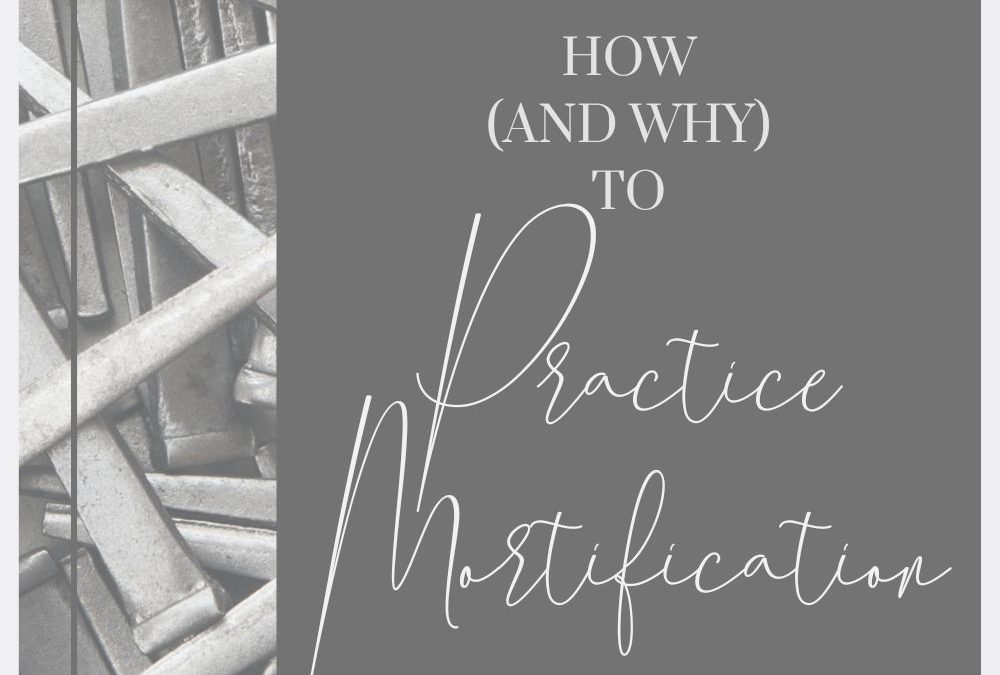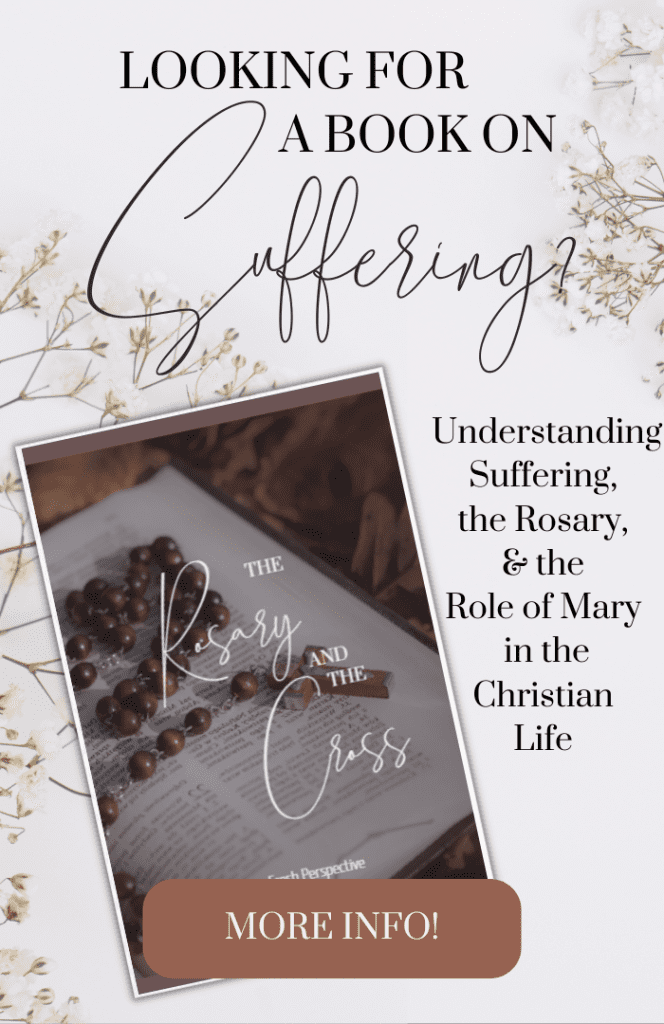The ability to make sacrifices in service of a greater good is the hallmark of maturity. – Jordan Peterson
Despite the horrors and negative connotations connected with its name, all mortification means is simply that one chooses what is right over how they “feel”. It means choosing to put the good of any given person, event, or outcome above what you “want”. To mortify oneself is to choose to do something hard or in order to prepare yourself to make the even harder choices later, even when you feel like you’d “rather die” than do it.
We practice mortification when we don’t allow our fear of pain to overcome our love of truth, and when we quell our fight or flight instinct in order to act with intelligence and intentionality.
It is a beautiful thing.
It’s what superheroes are made of!

We love superheroes. We admire their courage, audacity, and selflessness. We make movies about them and wear their t-shirts,
But, did you know you could actually be one?
Yes, you can!
Unlike all the super heroes in movies, no one is actually BORN a superhero in real life, we have to grow into it. That’s where the everyday practice comes in.
It is time for the heroic to become everyday and every day to become heroic. – Zelie Martin
Examples of Mortification
There are a thousand different options here and the different activities you choose will be as unique as your individual situation so don’t get hung up on exactly what is written here as the only way to do this, rather, try to understand the underlying traits so that you could apply it to any situation.
- Kneel while praying
- Keep a clean house (put things away, purge unnecessary items, wipe down surfaces regularly, etc)
- Holding your tongue (but only when what you want to say doesn’t comply with THINK – True, Honest, Inspiring, Necessary, Kind)
- Instead of saying or doing something unkind to anyone, do something extra nice for them.
- Cook cleaner, Eat cleaner. Fast.
- Say no to Procrastination
- Accepting daily trials without complaint
- Etc, Etc, Etc…
The key here is that it has to be a little bit painful. It has to cost you something, it has to take you to the very edge of your comfort zone where you may even tip off the edge a little bit.
It is called “death” if you remember, but it helps you grow.
Remember the Analogy of Mortification as a Spiritual Workout?
Mortification is when you voluntarily choose to stay in that low pushup position (or what ever your least favorite position is – for me it is lunges) – It is choosing to stay in that lunge or that low pushup until your limbs literally give out, until you have absolutely nothing left in the tank. Every person will have a different strength and ability level. Some days will seem better than others. Somedays you will be ON POINT and you will be able to hold the position for a long time, and other days your balance will be so off that even finding the right “form” feels impossible. But in both cases the important part is the fact that you gave it your all, and that you actually made the effort in the first place.
It is not enough just to do hard things.
That’s the most challenging fact of the spiritual life, and the one most often misunderstood.
People think we are supposed to want to do all these hard things or something is “wrong with us”, or that God is cruel to be so demanding.
First of all, um, NO ONE feels like doing mortification – that’s part of what makes it mortification – its also why people think mortification is masochistic.
Also, God does not “demand” mortification any more than life demands that we work out. There is no law saying that you must work out, but anyone who hopes to have good physical and mental health finds a way to incorporate physical exertion into their life anyway.

The trick to differentiating Mortification from Masochism is the WHY
Masochism is suffering for the sake of suffering – a twisted notion that the experience of pain brings us a weird kind of sadistic pleasure. It could be that you are embracing pain to “punish” yourself in some way for something and thus help yourself “feel better” about a deep guilt. It could also be that you are “embracing suffering” to feel somehow “above others” – stronger than them, “holier” than them, more “worthy” than them, etc. Anything masquerading as Mortification for the above reasons is absolutely false.
The Pharisee stood by himself and prayed, ‘God, I thank You that I am not like the other men—swindlers, evildoers, adulterers—or even like this tax collector. I fast twice a week and pay tithes on all that I acquire – Luke 18:11-12
This is the trickiest part about being deeply Christian:
It is not good enough just to do the “right thing”, you have to do the right thing for the right reasons!
Because in all reality, its not about what you do, its about why you do it.
and if you love, if you have good intentions in your heart – then good actions are a natural result.
Everything else is just hypocrisy. (Matthew 23:27-29)

What are the acceptable motivations for Mortification?
1 – Mortification as an Antidote for “Sin”
There are certain emotions or inclinations that we naturally have as human beings that are very powerful. They can cloud our judgment and overcome our will – this is why you hear people say, “I just couldn’t help myself” or “It just happened” or “I had to.” It is why people look mournfully on their sin and chalk it up to inevitable.
Its just the “way it is“, after all we are “only human“.
We run to psychology and self-care to assuage our guilt over being weak, but there is a better option. I’m not saying that finding ways to mentally handle our weakness and forgive ourselves and others for our weakness is bad, I’m just saying that we don’t have to stay there. That’s not the end of the story. Of course, we cannot wallow in self pity over our weakness, but we don’t have to accept it as our inevitable fate either. We can grow stronger!
In order to practice mortification for the purpose of avoiding sin, we need to spend time looking at our lives and why we do what we do. We must examine the root causes and use mortification to begin to exercise the opposite muscles.
For example:
- For someone who struggles with dishonesty or exaggeration, they may have to intentionally become more painfully precise in their speech,
- Someone who struggles with vanity or self-image may decide to give up makeup for a time.
- Someone who struggles with boasting, or gossip could practice holding their tongue in conversations where it is not necessary to speak in order to get better at knowing when to speak and when to stop, and being able to control it.
- Someone who struggles with self-control could practice not scratching at bug bites or other similar intentional impulse control activities
For he who is faithful in little things will also be faithful in great… – Luke 16:10
2 – Mortification for Spiritual Strength (Building of “Virtue”)
In our society virtue has become synonymous with pretentiousness. No one wants to be “holier than thou”. After all, God loves me “just the way I am”. Cultivating virtue is unpopular, antiquated, and overrated, not to mention impossible – therefore, it is almost always instantly dismissed. But did you know that the word virtue comes from the latin virtus which actually translates as STRENGTH? Yes, there is literally nothing pretentious about the word virtue, it is just strength. And we are obsessed with strength – Physical strength, mental strength, emotional strength – when we talk about he 4 areas of wellness we call them healths (physical health, mental health, emotional health, spiritual health) but really, we are just talking about strength.
Virtue is the fancy word for spiritual strength.

That’s why it is so important to exercise these spiritual muscles. Muscles grow stronger only by being used, broken down, and healed over and over again.
Some Examples (Ways to use Mortification to build Spiritual Strength/Vigor):
- Become aware of weak areas in your spiritual life – especially in terms of love for God and your willingness to put Him first – focus specifically on doing small actions that re-prioritize your commitment to God, – ie. praying in public, standing up for your Faith in conversations with others, being more careful about how you use the name of God in conversation and possibly draw other’s attention to it as well
- If you are struggling to find time for God, having direction, or focus in your life, you could make a Rule of Life and commit to living it.
- Something as simple as making and abiding by a meal plan can help people who feel flighty about their decision making skills.
- Be faithful to prayer times, devotions, commitments, resolutions, etc…
- 5 Second Rule
3 – Mortification as an Act of Love
I feel I am barely even beginning to scratch the surface of this truth in my own life, but basically, it means asking yourself, “Do I love enough to challenge myself to do this?” If this hard thing I should probably do anyway could show my love for God (or my spouse, or my kids, or my family, or anyone) WOULD I DO IT? Would the love I have for my friend with cancer be enough to motivate me to do this hard, necessary thing? If the little hard things I do mattered, if God could use them and give them value for someone I love, WOULD I DO IT?
Because God can do anything!
You know those times when you say, “Oh poor So-and-So, I wish I could do something for them”? Well, now you can. You can say, “Lord, I know I can’t do anything for my mom in another state right now but if smiling at my husband, or making sandwiches for my kids, or washing dishes, or paying bills COULD help her, I WOULD DO THEM. I will do them with all the vigor, intensity, and love in my soul, like those little things matter. BECAUSE they do!
You don’t get superhero status without being a superhero!
It’s pretty cool that it’s easier to be a superhero than we knew.
Share below if you have ever experienced the value of mortification in your own life! Have you ever tried this or is it an entirely foreign concept?
[mailerlite_form form_id=1]




